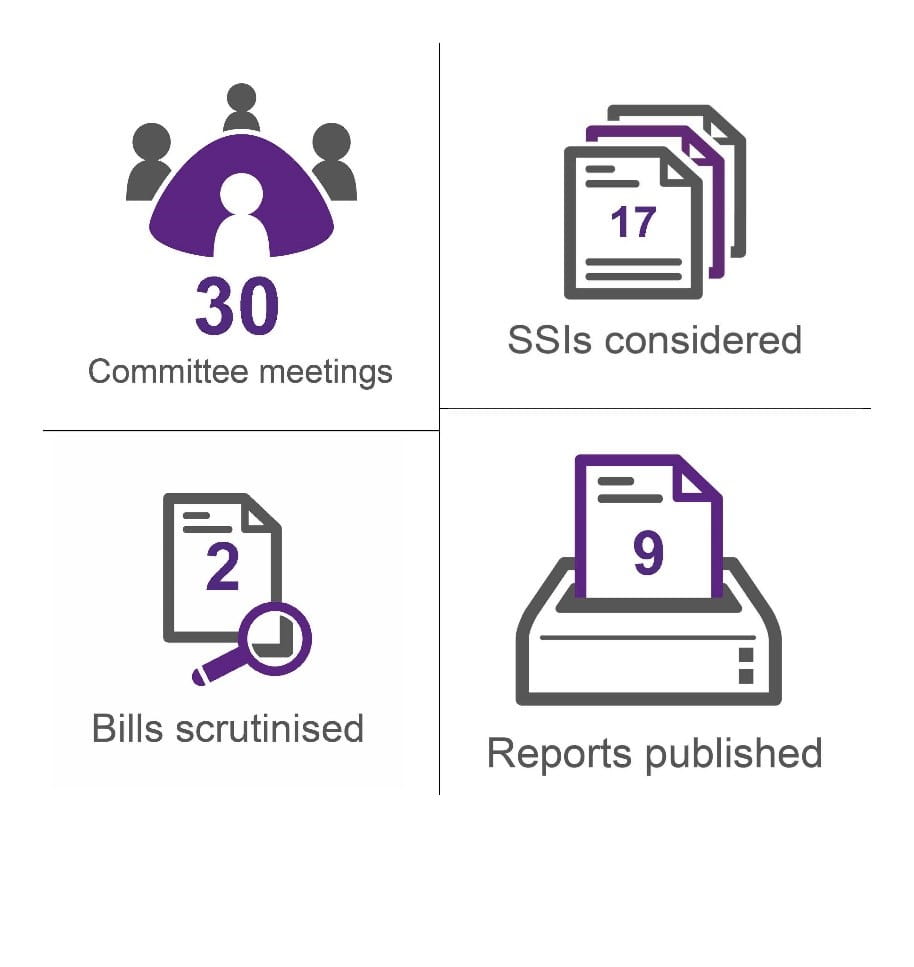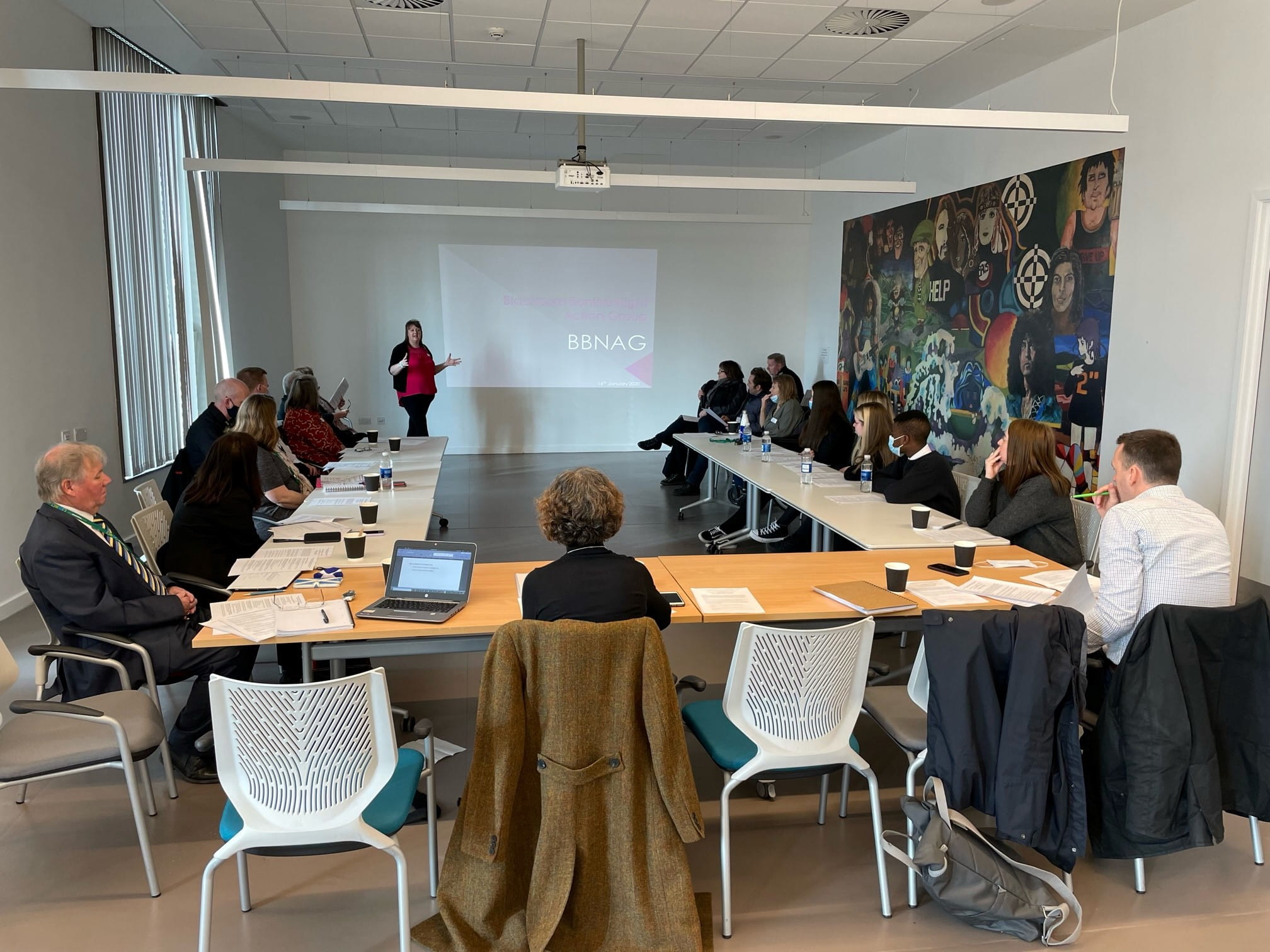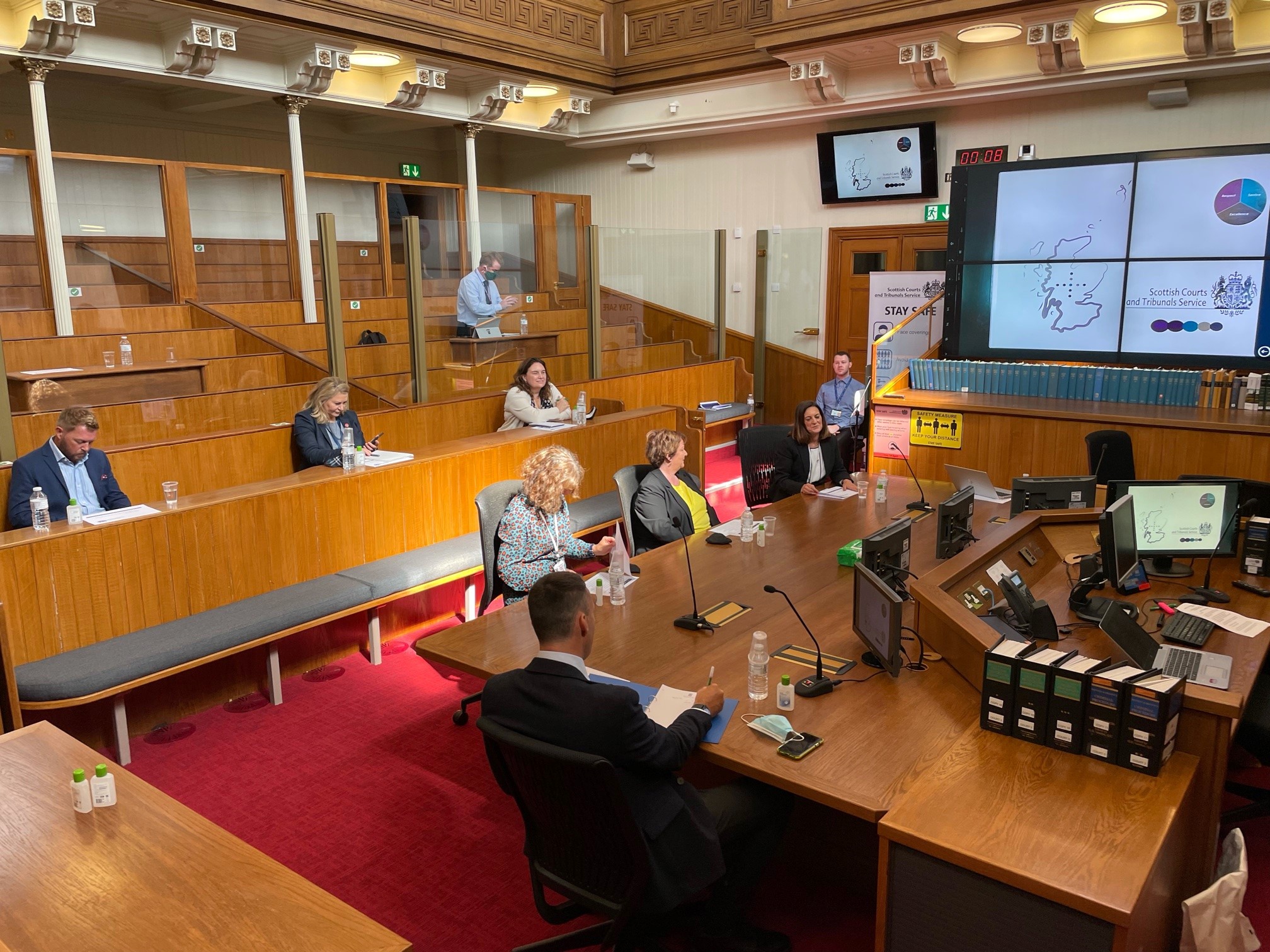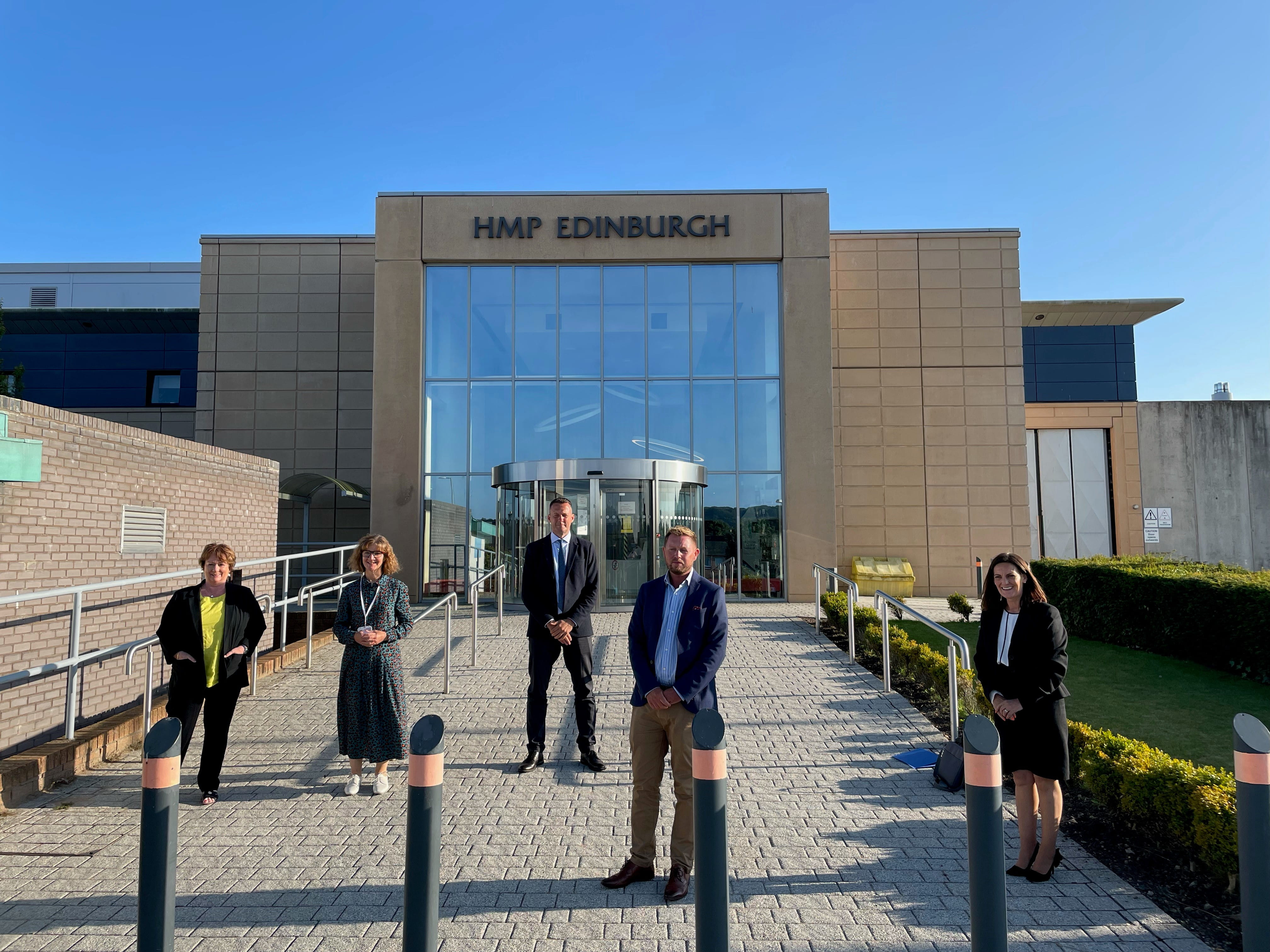Criminal Justice Committee
Annual Report for the Criminal Justice Committee (13 May 2021 to 12 May 2022)
Introduction
This report outlines the work of the Criminal Justice Committee ("the Committee") during the Parliamentary year from 13 May 2021 to 12 May 2022.
Membership changes
There have been no membership changes during that period
Meetings

The Committee held 30 meetings over this period. One meeting was held entirely in public, two meetings were held entirely in private and 27 meetings where some items were taken in private. Most items taken in private were to consider draft reports or the Committee's work programme. In total, 21 meetings were held in hybrid form in Edinburgh (with some MSPs or witnesses attending remotely and some in person) and nine meetings were held completely virtually (due to the COVID-19 public health emergency).
Witnesses
In total, 140 witnesses appeared before the Committee this parliamentary year.
Of the 11 Scottish Government ministerial appearances, 6 of them were by Keith Brown MSP, Cabinet Secretary for Justice and Veterans and 4 were by Ash Regan MSP, Minister for Community Safety. Angela Constance MSP, Minister for Drugs Policy also gave evidence to the Committee on one occasion.
Scrutiny of legislation
Fireworks and Pyrotechnic Articles (Scotland) Bill
The Fireworks and Pyrotechnic Articles (Scotland) Bill was introduced in the Parliament by the Minister for Community Safety, Ash Regan MSP, on 1 February 2022. The Parliament designated the Committee as the lead committee for Stage 1 consideration of the Bill. The policy objective of the Bill is to “protect public and community safety and wellbeing by ensuring fireworks and pyrotechnics do not cause harm, distress or serious injury”. The Bill also seeks to “support a cultural shift in how fireworks and pyrotechnics are used in Scotland”.
The Bill creates new restrictions on the purchase, acquisition, possession and use of various fireworks and pyrotechnics in Scotland. It also introduces new criminal offences which will apply where these restrictions are not complied with. The main provisions of the Bill as introduced are:
The establishment of a licensing system for members of the public wishing to purchase, acquire, possess, and use category F2 and F3 fireworks.
New restrictions on the dates on which such fireworks can be supplied to, and used by, the general public.
The creation of a new proxy purchase offence around the supply of fireworks and pyrotechnic articles to children.
New powers for local authorities to establish firework control zones.
New restrictions on the possession of certain pyrotechnic articles (such as distress and signal flares) at certain venues or events.
At the request of the Scottish Government, the Committee undertook an accelerated scrutiny timetable on the Bill. A four-week public call for views between 14 February and 11 March received 161 written responses. The Committee also undertook a digital engagement exercise on the Bill, in which over 1,400 people took part online, providing over 1,600 comments and giving nearly 11,000 ratings on the Bill.
On 14 March, the Committee undertook a fact-finding visit to Blackburn in West Lothian to meet with members of the Blackburn Bonfire Night Action Group. The Committee learned first-hand about the problems faced by communities from firework misuse, and how a community-based response had been developed.

The Committee took formal oral evidence from witnesses on 16, 21 and 23 March, and concluded its Stage 1 evidence-taking with Minister Regan on 30 March. The Committee published its Stage 1 Report on 28 April 2022. The Scottish Government’s written response was received on 1 May.
The general principles of the Bill were approved by the Parliament during its Stage 1 debate on the Bill on 3 May 2022. Further consideration of the Bill will occur in the next parliamentary year, with stage 2 on 25 May and 1 June, and stage 3 on 23 June.
Coronavirus (Recovery and Reform) (Scotland) Bill
The Criminal Justice Committee was a secondary committee on this Bill at Stage 1. The Committee considered its justice provisions. There were two types of justice provisions – permanent and temporary. The permanent changes were ones put in place during the pandemic, but which the Scottish Government considered were worthy of retaining on a permanent basis.
The temporary justice measures in the Bill attracted more interest. The Committee took evidence on proposals to extend temporary powers in areas such as virtual trials, fiscal fines, time limits for criminal proceedings, and the release of certain prisoners. The Committee gave its views on the proposals in a report on the Bill which made recommendations for improvements to the proposed legislation, and was published on 4 April.
Stage 2 consideration by the Committee took place on 8 June and Stage 3 is set for the Chamber on 28 June.
Subordinate legislation
During the parliamentary year, the Committee considered 17 Scottish Statutory Instruments (SSIs), 14 of which were negative instruments and 3 were affirmative instruments.
One instrument in particular – the Prisons and Young Offenders Institutions (Scotland) Amendment Rules (SSI 2021/446) – came in for detailed consideration which led to changes in the regime for tackling drug smuggling in prisons through the mail received by prisoners. The changes to prison rules whereby some suspected mail would be photocopied instead followed a call from the Committee for the Scottish Prisons Service and the Scottish Government to address the situation.
Other scrutiny work
Pre-Budget Scrutiny of the Scottish Government's Draft Budget 2022-23
In the autumn of 2021, the Committee completed its pre-budget scrutiny of the Scottish Government’s then draft budget for 2022-23. The Committee published its report on 10 November 2021
The report looked at the spending priorities across a number of issues, including:
Impact of COVID
Budget for the COPFS
Budgets for prisons, prison reform and secure care
Budgets for policing and fire and rescue
Support for victims of crime
Budgets for legal aid
The Scottish Government’s spending plans to finance legislation proposed as part of its Programme for Government
The Scottish Government’s response to the Committee’s recommendations was considered at our meeting of 19 January 2022.
The Committee will commence budget scrutiny again in the autumn to look at spending during the remainder of this financial year and the Scottish Government’s draft budget proposals for 2023-24.
Action Plan and Priorities for the Justice Sector in Session 6
Between September and November 2021, the Criminal Justice Committee held a series of roundtable meetings, looking at a number of key issues in the justice sector. These included sessions on domestic abuse, gender-based violence and sexual offences and problem drug use, which are detailed below.
As a result, the Criminal Justice Committee published a report (on 10 January 2022) setting out its priorities for the criminal justice sector in Scotland and its Action Plan.
The Committee also published an Action Plan as a tool to monitor progress against the delivery of the Committee’s recommendations. The Committee intends to update the Action Plan at periodic intervals during the session.
One particular impact of this work has been the greater clarity around the Lord Advocate’s view on safe consumption rooms, which she articulated during our evidence-taking on the Action Plan.
Tackling violence against women and girls
The Criminal Justice Committee held a roundtable evidence session on domestic abuse, gender-based violence and sexual offences (priorities in Session 6) on 22 September 2021.
The Committee agreed, as part of its action plan, short- and long-term actions to address the issues raised. This included urgent progress to be made on the implementation of Lady Dorrian’s recommendations to improve the management of sexual offence cases. The Committee also recommended measures to: improve co-ordination within the Scottish Government; tackle delays in prosecuting these crimes; updates from the Scottish Government on plans for specialist sexual offence courts, the not proven verdict and judge-only trials; and measures to review the experience of women and girls in the criminal justice sector.
The Committee met informally with survivors of sexual assault, domestic abuse, sexual harassment and bullying, as well as frontline practitioners on 24 November 2021. They provided powerful testimony about their experiences of the criminal justice system, many of which were retraumatising. We are extremely grateful to them for their courage in telling us about their experiences. Their testimony helped to inform the Committee’s action plan for this parliamentary session.
Following the informal meeting, the Committee scheduled three further evidence sessions to discuss the issues raised. The Committee heard from the Scottish Courts and Tribunal Service on 8 December, from Police Scotland on 15 December and from the Lord Advocate on 22 December 2021.
The Committee followed up the specific issue of victims gaining access to court transcripts, which was raised during the informal meeting. The Committee wrote to the Lord President to explore whether an exception can be made to the request for fees for court transcripts for survivors of rape and other sexual offences. The Lord President responded that charges and exemptions are a matter for the Scottish Minsters, and fees are not set by him or the Scottish Courts and Tribunal Service. The Committee will be considering this issue again.
Cross-committee working on efforts to reduce drugs deaths and drug harm
The Criminal Justice Committee held a roundtable evidence session on Misuse of Drugs and the Criminal Justice System on 27 October 2021.
The Committee heard from people who bravely shared their personal experiences of drug use and the criminal justice system. We are very grateful to them. They told us that: there was an urgent need for action to be taken on the recommendations of the Taskforce; that it was time to see outcomes from their work; and that the Parliament could provide scrutiny of the impact of the Taskforce’s work across the relevant portfolio areas. Their evidence helped to inform the Committee’s Action Plan for this parliamentary session.
On 1 December 2021, the Criminal Justice Committee agreed to approach the members of the Health, Social Care and Sport Committee and the Social Justice and Social Security Committee with a view to holding a joint, public meeting in early 2022 to take evidence from the relevant Scottish and UK Ministers and senior members of the Scottish Drug Deaths Taskforce on the progress made in delivering the Taskforce recommendations and the remainder of its work.
It was agreed that 3 or 4 representatives from each Committee would meet, depending on the number of parties represented on each, to keep numbers manageable and to ensure that all parties were represented.
Members of the three Committees met on 1 and 2 February 2022. Members heard from the UK Minister for Crime and Policing, Kit Malthouse, and from the Scottish Government Minister for Drugs Policy, Angela Constance. The three Committees led a Chamber debate on tackling drug deaths and problem drug use on 31 May. They are to meet again in September 2022.
Petitions
The Committee has two current petitions which it is considering:
Petition PE1458 (first introduced in December 2012) - is a petition by Peter Cherbi calling on the Scottish Parliament to urge the Scottish Government to create a Register of Pecuniary Interests of Judges Bill or amend present legislation to require all members of the Judiciary in Scotland to submit their interests and hospitality received to a publicly available Register of Interests.
Petition PE1370 (first introduced in November 2010) - is a petition by Dr Jim Swire, Professor Robert Black QC, Mr Robert Forrester, Father Patrick Keegans and Mr Iain McKie on behalf of Justice for Megrahi on opening an independent inquiry into the 2001 Kamp van Zeist conviction of Abdelbaset Ali Mohmed al-Megrahi for the bombing of Pan Am flight 103 in December 1988.
At its meeting of 26 January 2022, the Committee considered these two petitions and agreed to keep them open, pending further developments.
Equalities, engagement and innovation
As part of its focus in equalities issues, the Committee has prioritised the issues of violence against women and girls and also the treatment of women and young people in prison and secure care as key areas of focus for this parliamentary session; as detailed above.
The Committee has also considered the calls from Dame Helena Kennedy QC for new legislation to tackle misogyny when it met with her to take evidence on her report on this issue.
Public engagement remains an important priority for the Committee. For example, at its roundtable evidence session on 27 October 2021 on misuse of drugs and the criminal justice system, the Committee asked people with experience of problem drug use to provide evidence. The Parliament’s Participation and Communities Team liaised directly with individuals to prepare them ahead of giving evidence in public. The witnesses agreed to begin the evidence session by providing brief details of their background. This approach meant that the witnesses could prepare what to say in advance and could explain their experiences in the way they thought best. Starting the meeting in this way, helped to put the witnesses at ease, as they could then focus on the purpose of the meeting, which was to consider how to address drug deaths and drug harm.
All of these sessions have proved immensely valuable in enabling the Committee to better understand the issues from those with real life experiences. We are grateful to all who took part in these sessions.

Finally, external visits and informal briefings are an important way for Members to better understand what is happening in different parts of the criminal justice system. As such, in this parliamentary year, we have visited:
The courts in Edinburgh to meet with the Lord President and others and see how virtual trials work;
HMP Edinburgh to meet with the Governor, his staff, drugs support charities and prisoners;
Visit to Gartcosh and the Scottish Crime Campus in September 2021. This included a briefing on plans for the policing of the COP26 conference.
Local communities in Blackburn, West Lothian, on the misuse of fireworks (see above), and;
The Wise Group in Glasgow to meet with its staff and clients who have experience of the prison system, bail and the support needed after release from incarceration.

We have also held a briefing with Police Scotland and the National Crime Agency on efforts to tackle serious and organised crime in Scotland.